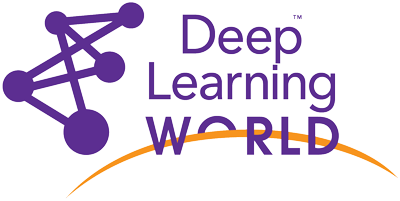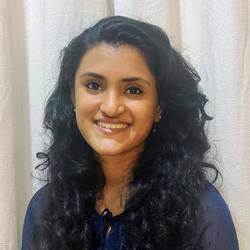Agenda
Deep Learning World 2022
June 19-24, 2022 – Caesars Palace, Las Vegas
Workshops - Sunday, June 19th, 2022
Full-day: 8:30am – 4:30pm.
PDTPython leads as a top machine learning solution – thanks largely to its extensive battery of powerful open source machine learning libraries. It’s also one of the most important, powerful programming languages in general.
Workshops - Monday, June 20th, 2022
Full-day: 8:30am – 4:30pm PDT.
This one-day session surveys standard and advanced methods for predictive modeling (aka machine learning).
Full-day: 8:30am – 4:30pm PDT.
Machine learning improves operations only when its predictive models are deployed, integrated and acted upon – that is, only when you operationalize it.
Full-day: 8:30am – 4:30pm PDT.
This one-day introductory workshop dives deep. You will explore deep neural classification, LSTM time series analysis, convolutional image classification, advanced data clustering, bandit algorithms, and reinforcement learning.
Deep Learning World - Las Vegas - Day 1 - Tuesday, June 21st, 2022
Nvidia's Siddha Ganju has gained a unique perspective on machine learning's cross-sector deployment. In her current role, she work's on a range of applications, from self-driving vehicles to healthcare, and she previously led NASA's Long-Period Comets team, applying ML to develop meteor detectors. Deep learning impacts the masses, so it demands mass, interdisciplinary collaboration. In this keynote session, Siddha will describe the very particular interdisciplinary effort -- driven by established joint directives -- required to successfully deploy deep learning across a variety of domains, including climate, planetary defense, healthcare, and self-driving cars.The format of this session will be a "fireside chat," with PAW Founder Eric Siegel interviewing Siddha in order to dig deep into the lessons she's learned.
Machine learning and robotics are dramatically shifting our industrial capabilities and are opening new doors to our functional understanding and ways to support the natural world. Together, these advances can enable something far beyond simply limiting our damage to the planet -- they create the possibility of building a new relationship to nature wherein our industrial footprint can be radically reduced and nature's capability to support itself and all life on Earth (including us!) can be amplified.
As the world of Machine Learning (ML) has advanced, the biggest challenge that still faces data science organizations is the need for insightful, valuable, predictive attributes, aka “features” that can be applied to ML models. The process of building features is so tedious and costly that the “feature store” was invented to make re-building features a thing of the past.
The problem is that traditional means of building features to feed feature stores have been manual, labor-intensive efforts that involve data engineers, subject matter experts, data scientists, and your IT department. But what if there was a faster and more scalable way? Join dotData’s VP of Data Science, Dr. Aaron Cheng as he presents the concept of the automated Feature Factory and see how your organization can take a process that today takes months, and do it in a few days.
Recommender Systems are an integral part of Walmart's online e-Commerce platform, driving customer engagement and revenue. In this session, we'll present an approach to use causal inference to learn user-attribute affinities through temporal contexts. We'll also talk about how we leverage the temporal structure in users' repeat purchase behavior to recommend relevant categories of products to users.
By leveraging the power of the Metapath2Vec algorithm from raw representations, we form a heterogeneous interaction graph from the e-Commerce purchase/transaction data and traverse it using random walks of different lengths to get the context vectors for different nodes (users, baskets, categories, etc.). We obtain the Metapath2Vec embeddings by implementing the heterogeneous skip-gram model in TensorFlow and use the TensorFlow Probability/Edward to define large scale probabilistic models and do black-box Variational Inference optimization in an OOPS framework.
Extracting key-fields from a variety of document types remains a challenging problem. Services such as AWS, Google Cloud and open-source alternatives provide text extraction to "digitize" images or pdfs to return phrases, words and characters. Processing these outputs is unscalable and error-prone as varied documents require different heuristics, rules or models and new types are uploaded daily. In addition, a performance ceiling exists as downstream models depend on good yet imperfect OCR algorithms.
We propose an end-to-end solution utilizing computer-vision based deep learning to automatically extract important text-fields from documents of various templates and sources. These produce state-of-the-art classification accuracy and generalizability through training on millions of images. We compare our in-house model accuracy, processing time and cost with 3rd party services and found favorable results to automatically extract important fields from documents.
Bill.com is working to build a paperless future. We process millions of documents a year ranging from invoices, contracts, receipts and a variety of others. Understanding those documents is critical to building intelligent products for our users.
At One Concern, we develop models for digital twins and their resilience by employing machine learning and advanced statistical methods to build a platform where organizations, communities, and private and public sectors understand, forecast, and mitigate climate risk. This session will cover how One Concern develops digital twins and resilience models by applying machine learning algorithms.
Join Sharada Narayanan, dotData Data Scientist, as she presents on the challenges of building a predictive analytics practice in small organizations. What do you do when you don't have an established data science team but want to benefit from AI and Machine Learning? Sharada will walk through the problems of adopting an ML practice and how new techniques and tools can help accelerate the adoption process
AI is everywhere—and you can use it today across a variety of industries and scenarios. Join this session where Shell team talk about the Data Science platform & Edge Platform. We will provide a behind-the-scenes look at the technology & Shell.ai Platform helping in accelerating development of Ai Products, and where it's taking this diverse company.
Asset prices are primarily affected by fundamental, technical, and market sentiment factors. The last factor refers to the public perception of the market and individual instruments traded within. While this perception is not solely based on information published in the media, online news sources and social media websites have a high impact on market sentiment and consequently, asset prices. A journalist with an investigation disclosing publicly traded company's unethical or illegal business practices will more-than-likely cause a change in market sentiment, which in-turn would result in a stock price change. Due to the impact of online media on the financial markets, sentiment-driven trading strategies have been and still remain an integral part of hedge fund portfolios. In this session, Vladyslav Ivanov, a Quantitative Researcher for Outremont Technologies digital assets manager, will cover the current state-of-the-art transformer-based deep learning models for sentiment analysis. He will discuss use of these models in the context of forecasting technology sector asset prices and will perform empirical assessment of models performance. The subjects of models application in latency-sensitive environments, as well as integration into the signal generation processes will also be addressed.
Long short term memory neural networks (LSTMs) originally rose to prominence in natural language processing, but have also shown value in time series. One drawback of LSTMs, and neural networks more generally, is that it can be difficult to derive effective confidence intervals. Two primary methods for calculating confidence intervals in LSTMs have been proposed: dropout-based simulation and estimating probability distributions.
In this case study we look at dropout-based simulation, which we found to be effective and more flexible than distributional estimation. However, added flexibility came at the cost of elevated computational burden.
Deep Learning World - Las Vegas - Day 2 - Wednesday, June 22nd, 2022
Training a search relevance model using grocery shopping engagement data is challenging since the user behavior is different compared to the other e-commerce applications.
People add multiple items to their cart and buy previously purchased items regardless of search relevance, thus user engagement data becomes noisy.
In this talk, we show how to train a transformer based embedding model using this noisy data. We propose various data cleaning/augmentation techniques, self adversarial negative sampling and cascade training to efficiently utilize the data. The trained model outperforms the existing baseline on human annotated data.
In this session, Google Research Scientist Hamza Farooq will cover a data-driven, NLP-based framework for understanding Google customer feedback across any text-based data sources. He will cover a framework named Stardust that uses an ensemble of machine learning / deep learning models to parse and score topics to measure sentiment and context pertaining to trust and customer experience
Historically, edge machines have been viewed as dumb devices with the simple expectation that they perform tasks on command. With the recent advancements in deep learning, can we change this norm? Yes — with adaptive intelligence but the definition of this intelligence varies by form factor and associated experiences.
This session gives an inside view of inferencing on edge devices at Qualcomm. We discuss two classes of use cases: high performance and ultra low power. Our high performance use cases span multiple verticals that leverage computer vision applications (streaming, gaming and auto). Our ultra low power use cases are Always on Vision, Always on Audio and sensing in the Mobile and IoT markets.
Building an ML solution leveraging deep learning is not just about building a core model. A solution may entail building and maintaining multiple models. In addition, several enabling technologies and tools are also required. Can an organization build each of these technologies in-house? How does this impact overall costs and time to market? With several open source and commercial off-the-shelf offerings becoming available, when should an organization build these technologies and when should it buy them? In this session, we will discuss how to make these build vs buy decisions, including benefits, decision criteria and critical success factors.
In this informal but informative presentation, Dr. James McCaffrey from Microsoft Research will explain advanced neural architectures including variational autoencoders, generative adversarial networks, Siamese networks, and Transformer architecture encoders. You’ll see running demos of each type of network. No math equations with Greek letters. Well, maybe one or two. You’ll leave this presentation with a solid understanding of what type of problem each network can (and cannot) solve, and have the all the knowledge you need to communicate with subject matter experts. No experience with neural networks is necessary to understand and benefit from this presentation.
Pull requests (PRs) have become de facto standard for code review/merge process by development teams using SCM tools like Github, Bitbucket. PR is a rich source of information about developers & reviewers. PRs can give us quite a lot of insights about the coding styles, logical skills of the developers as every single line of code is being reviewed and bad smells are getting highlighted by the reviewer. The comments/suggestions that reviewer gives helps in understanding the proficiency of the reviewer. We have developed a set of PR Analytics by applying Transformers based NLP, Decision Trees & Statistical Analysis on PR data.
PR Analytics can be used to perform skill assessment in order to find out the areas of improvement for the development team in a quantitative manner. PR Analytics can also help the Scrum masters & the project managers to better plan their deliverables since now they know strengths & weaknesses of the development team and can allocate the right developers for the right type of tasks
In this talk I would present some of the analytics that we have developed using data from bitbucket and how we are using them for improving the efficiency of our development teams.
Offering well-designed rewards is essential for increasing the engagement of the users. Boosting user activity in the desired products helps economies of scale and increases the efficiency of the platform. However, rewards incur significant cost. Therefore, designing an efficient learning algorithm to optimize marketing campaigns can significantly increase the profitability of these platforms.
In this talk, we consider the following problem: given a set of different promotion structures, assign each user to a promotion structure from the set, or nothing at all. The goal is to maximize user retention while respecting the budget/keeping the cost low. I propose a novel methodology to maximize the treatment effect in a budget constraint setting. Furthermore, we use Boltzmann-exploration to balance exploration and exploitation. This enables us to efficiently collect data and update the model regularly. Finally, I show that our approach outperforms the other alternatives including R-linear and generalized random forest.
The complexity and computational requirement for deep learning are higher than with traditional machine learning methods such as logistic regression and decision trees. For some problems, especially those with few inputs, deep learning is overkill -- you might as well just use traditional methods. However, with continually-growing computational power and with the introduction of new modeling techniques such as transfer learning, will deep learning eventually become the de facto method for all applications and problem areas? Attend this session to hear the expert panelists weigh in and address questions from the audience.
Workshops - Thursday, June 23rd, 2022
Full-day: 8:30am – 4:30pm PDT
This one-day session reveals the subtle mistakes analytics practitioners often make when facing a new challenge (the “deadly dozen”), and clearly explains the advanced methods seasoned experts use to avoid those pitfalls and build accurate and reliable models.
Full-day: 8:30am – 4:30pm PDT.
This one day workshop reviews major big data success stories that have transformed businesses and created new markets.
Full-day: 8:30am – 4:30pm PDT
This workshop dives into the key ensemble approaches, including Bagging, Random Forests, and Stochastic Gradient Boosting.
Three hour workshop: 5:30-8:30pm PDT.
This 3 hour workshop launches your tenure as a user of R, the well-known open-source platform for data analysis.
Workshops - Friday, June 24th, 2022
Full-day: 8:30am – 4:30pm PDT.
Gain experience driving R for predictive modeling across real examples and data sets. Survey the pertinent modeling packages.




























